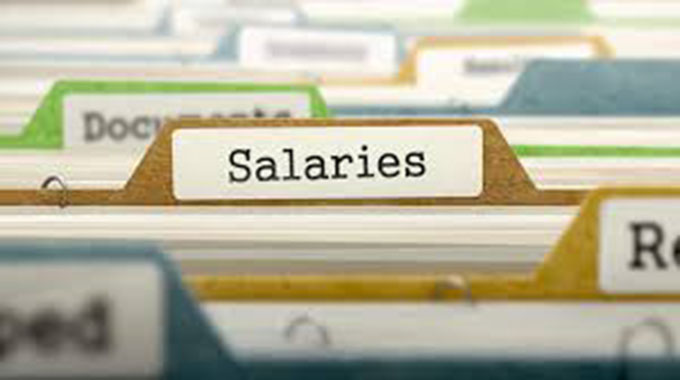Editorial Commen: Civil servants must be realistic over salaries

The dramatic stability in prices for more than two months is built around the stability in the exchange rate, shifting by a fraction of one percent each week.
This stability is not just at the auctions. The banks are increasingly becoming involved in their proper role, of buying retained earnings from exporters and selling this to importers. But they are using the auction rate for this business and there are obviously a lot of both importers and exporters who like the idea of fixed rates, rather than having to make a bid at an auction.
Now that all importers in the productive sector get all their foreign exchange on the auction or through a bank at auction rate, the diaspora remittances that feed the black market are enough for the small number, in terms of value, of importers outside the auction system.
So the black market rate has also been stable since the start of the auctions, and in fact many economists now reckon that the premium is far too high considering the economic fundamentals.
But underlying this huge swathe of monetary stability is the fact that there is fiscal stability. Government is not spending more than it receives, largely through taxes.
Since the start of the Second Republic, Government has stopped printing money, either on presses or digitally, and so has limited demand-pull inflation. The cost-push inflation was limited by the resultant market forces working through the auctions to stabilise the exchange rate.
All this is fairly basic economics and the sort of thing that most finance ministers and central bank governors around the world take as read, with budgeting involving two processes: figuring out what percentage of national income can be taken as taxes and then what taxes will be raised to bring that share into the common purse, and secondly figuring out how to divide that tax revenue between all the functions that Governments need to spend their money on.
The only reason why this approach needs comment in Zimbabwe is that because for almost four decades the First Republic was borrowing money, and then printing money, to pay its day-to-day bills and so subjecting its citizens to bouts of inflation and hyperinflation, although the last bout of inflation was because of past sins coming home to roost, the digital printing of fake dollars in the last years of the First Republic since there is a time lag between inflating money supply and inflating prices.
But these pressures are now out of the system, so we can take a deep breath. The instance on fiscal and monetary discipline explains the long drawn-out pay negotiations between the Government and its employees, the civil servants with the uniformed services benefiting from the same deal that their civilian counterparts negotiate.
Government has made it clear that it wants to upgrade pay and benefits of civil servants, that it understands the financial stresses they face, and that it will spend what it can afford on making a deal.
It has shown its good faith three times already in the last few months, with two interim salary increases, both done outside the negotiating forum and the Covid-19 allowances now extended to the end of the year.
In other words as tax revenues rise in nominal terms, Government has passed on to its employees their share of that extra money. Tax revenues rose as a result of inflation and the private sectors pushing up their pay as and when they could.
This need to have the extra tax money before spending it explains why civil servants pay rises tend to come a month or two after private sector wage rises. Government is not making any predictions, just counting the dollars the tax collectors hand over, slicing off the share due to its staff, and then working out the best way in terms of percentage and fixed-sum increases that it can divide this extra cash among its workers.
This is why minister after minister has been stressing that civil servants must be realistic in their negotiations. And the tendency of civil servants to base their negotiating position on the minimum pay they were earning when Government was printing fake US dollars is not being realistic.
Printing money solves nothing. Neither do the other alternatives, such as doubling civil service pay by firing half the civil servants, seem to use to be a sensible solution.
What is needed is a high element of trust and perhaps more frequent reviews within a review system. Government has said, several times, that it spends about half its revenue on staff costs.
That opens one door, that civil service negotiators are given the actual figures, monthly if necessary of revenue and any increases in revenue, so that they know they are getting their share.
This still leaves a lot of room for negotiations, such as how increases are to be distributed. The interim pay rises were both percentage increases, and a fixed allowance for all that tends to narrow pay gaps and so benefit the lowest paid, who need money just to buy food, the most.
Other refinements would be other benefits, such as fixing up public transport further so that civil servants can get to work more easily and more cheaply. Housing is a major issue.
Government has now agreed it will stop selling off its own housing stock, putting most departments in the same bracket as say the police, who never sell or throw away a house, even if some were obviously built for “native constables” in early colonial times and who, while they have fallen behind in adding to their stock of housing, do twist the Treasury arm for more every year.
There are reasons why mission schools and older boarding schools have fewer staff problems, they can house most of their teachers.
There are other areas where the civil servants can benefit from Government programmes out of the staff budget. Government is keen on a massive housing drive involving private and State sectors.
That surely means that a significant chunk of the Government investment can directly benefit its own staff, while the private investment benefits the employees in those sectors.
But in the end, the only way civil servants, and everyone else in Zimbabwe, is going to become richer is if Zimbabwe produces more. Workers in the productive sectors must benefit from their share of the rising production, but civil servants, although they are not direct producers, win because higher taxes in real terms means Government can afford to pay more in real terms.
We cannot destroy the immense progress we have made under the Second Republic. What civil service negotiators need to ensure is that the Government’s employees get their fair share of the rising wealth that fixing the fundamentals, as we have been doing, will generate.








Comments